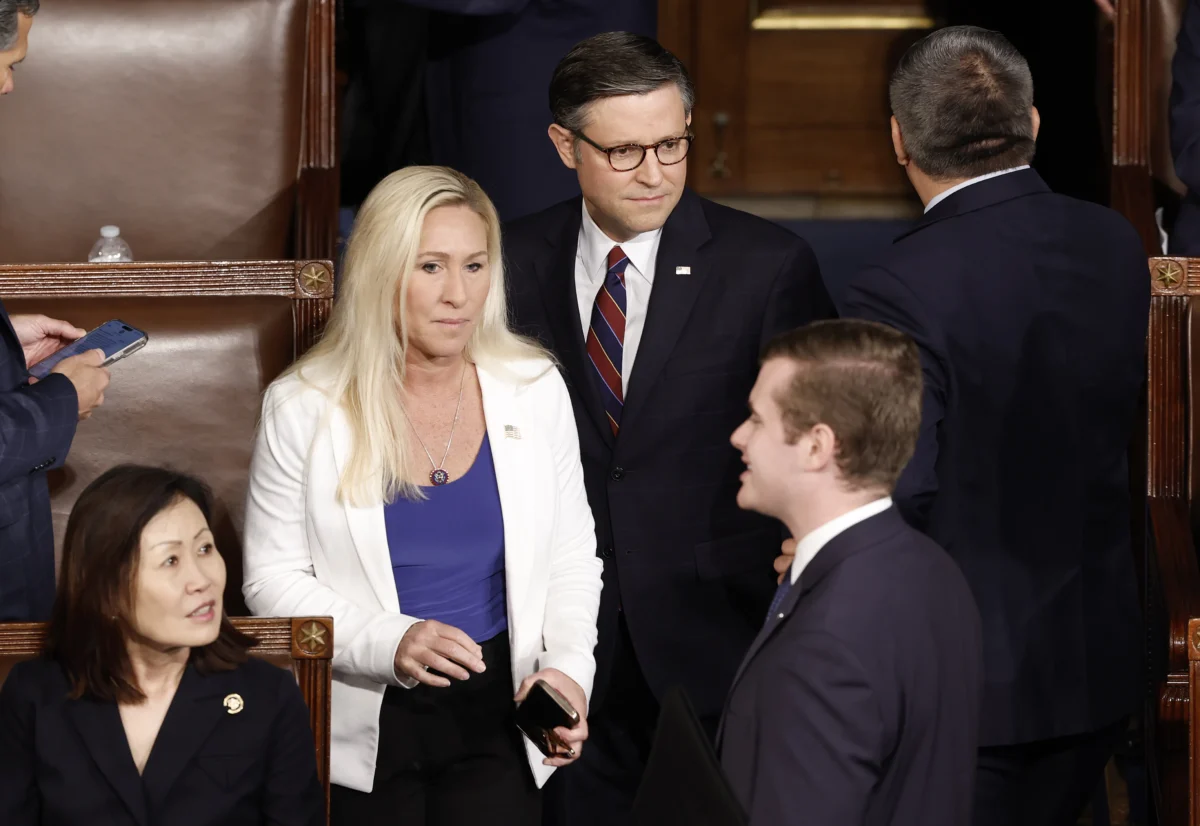The Senate on April 23 voted to pass a $95 billion national security package that includes foreign aid for the war-torn nations of Ukraine and Israel, as well as the Indo-Pacific. The bill also includes a measure to force TikTok to divest from its Chinese parent company to address national security concerns.
The bill will now go to the desk of President Joe Biden, who’s expected to quickly sign it.
It passed through the upper chamber in a 79–18 nighttime vote.
The aid package’s final clearance through Congress marked a win for President Biden, Democrats, and more hawkish Republicans supporting Ukraine aid. But conservatives have decried the package for its billions to Ukraine and lack of border security measures.
Earlier in the day, a motion to order cloture and limit debate on the funding package was passed by the Senate in an 80–19 vote.
President Biden, in a statement, celebrated the bill’s passage, calling it a “critical legislation” that “will make our nation and world more secure as we support our friends who are defending themselves against terrorists like Hamas and tyrants like Putin.”
The president said he will sign it into law on April 24 so the administration can start sending weapons and equipment to Ukraine this week. Reuters earlier reported that the United States plans to send a $1 billion arms package to the war-torn country.
The bill’s passage in the upper chamber comes three days after the House passed the package, which was split up as four seperate bills, with bipartisan support over the objections of the GOP’s right flank.
Leadership in both parties was quick to heap praise on the bill, which has deadlocked Congress on the issue for months.
Senate Minority Leader Mitch McConnell (R-Ky.) framed it as a victory for Americans’ role in the world over what he described as “isolationism” within his own party.
“We can wish for a world where the responsibilities of leadership don’t fall on us,” Mr. McConnell said, “or we can act like we understand that they do.”
Senate Majority Leader Chuck Schumer (D-N.Y.) was ecstatic at the bill’s passage, saying, “Finally, finally, finally, after more than six months of hard work and many twists and turns in the road, America sends a message to the entire world: we will not turn our back on you.
“Tonight, we tell our allies ‘We stand with you,'” Mr. Schumer said. “We tell our adversaries, ‘Don’t mess with us.'”
Others in the upper chamber were less enthusiastic.
Asked his thoughts about the bill’s passage, Sen. Roger Marshall (R-Kan.) said he felt “sick. Nauseated.”
Together, the package includes $61 billion for Ukraine, $8.1 billion for the Indo-Pacific, and $26.4 billion for Israel and humanitarian aid for Gaza. It also includes a measure forcing Chinese divestment of TikTok and allowing the government to give seized Russian assets to Ukraine.
Speaking at a press conference following the procedural vote earlier in the day that advanced the legislation and all but guaranteed its passage, an upbeat and clearly relieved Mr. McConnell fielded an abnormally large number of questions from the press.
“This is an important day for America and a very important day for freedom-loving countries around the world,” Mr. McConnell said.
In later questioning, he suggested that the 30 GOP votes that all but delivered the bill over the finish line show that the “isolationist wing” of the Republican Party—which he said was typified by pundit Tucker Carlson—is on the retreat.
Those 30 Republican votes represent a substantial uptick from previous Ukraine funding packages.
Borderless Package Rankles Republicans
The legislation faced fierce opposition from Republican members who felt that securing the southern border should take precedence over sending financial assistance to foreign countries, particularly Ukraine.
The House package includes $300 million for Ukraine’s border patrol equivalent, but nothing for U.S. border security funding or policy changes.
Speaking to The Epoch Times, Sen. Rick Scott (R-Fla.) asked “Why are we securing Ukraine’s border?”
Mr. Scott also cited the bill’s nearly $10 billion for humanitarian funding in Gaza and elsewhere as a reason for his opposition to the package, despite his desire to aid Israel.
The issue has also been a concern in the House.
Rep. Harriet Hageman (R-Wyo.), who was among the 55 Republicans who opposed the advancement of the foreign aid package in the lower chamber, argued that it was wrong for the United States to be securing the borders of other nations amid the ongoing crisis at the southern border with Mexico.
“We’re sending $300 million for the state border guard services of Ukraine … yet won’t spend the same kind of money here to secure our own border,” Ms. Hageman said.
Some Senate Republicans are opposed to the whole Ukrainian enterprise.
Sen. Ron Johnson (R-Wis.) told reporters ahead of the April 23 vote, “I see no possible strategy to win the war,” opining that any strategy to deliver a total Ukrainian victory risks escalation to nuclear war.
“Putin is not gonna lose this war,” Mr. Johnson argued.
He called Russian President Vladimir Putin “a bloody war criminal,” but noted that Russia still has far more population and military capacity than Ukraine can hope to match, and cited the failure of Ukraine’s counteroffensive that’s ended in a “stalemate.”
Others have complained that passing Ukraine aid now effectively removes all leverage Republicans had over Democrats. Republicans once hoped to use Ukraine aid to force border concessions from Democrats.
“As the Senate passes on Tuesday what the House passed last night, we will have relinquished what little bargaining power we had left” to secure the border, Sen. Mike Lee (R-Utah) told Fox News’ “Sunday Morning Futures.”
Mr. Lee noted that part of the GOP’s strategy in holding off on additional Ukraine funding was to “force Joe Biden’s hand” on the border. “That didn’t happen, and the Republican-led House of Representatives walked away from that yesterday,” he said.
House Infighting Over Package
Still, House Speaker Mike Johnson (R-La.) has insisted in comments to reporters that he felt bringing the bills to the House floor was the right move.
“I’ve done here what I believe to be the right thing, and that is to allow the House to work its will. And as I’ve said, you do the right thing and you let the chips fall where they may,” he said after the package was passed.
Mr. Johnson’s willingness to join with Democrats on other recent bills had already fractured the House GOP and thrown his speakership into question. Now, with this latest move, he faces escalating blowback from some in the right flank.
“Speaker Johnson refuses to use his power as speaker of the House to do any type of negotiating to secure the southern border and stop the madness in our country,” Rep. Marjorie Taylor Greene (R-Ga.) told Fox News.

Charging the speaker with betrayal, the congresswoman called on him to resign.
“Mike Johnson’s speakership is over. He needs to do the right thing—to resign and allow us to move forward in a controlled process. If he doesn’t do so, he will be vacated,” she said.
Her move to oust the speaker, she added, is “coming regardless of what Mike Johnson decides to do.”
Ms. Greene filed a motion to strip Mr. Johnson of the gavel last month as “more of a warning and a pink slip.” Although a vote has yet to be triggered, Reps. Thomas Massie (R-Ky.) and Paul Gosar (R-Ariz.) have also voiced their support for the speaker’s removal.
Doubling down on her position on April 22, Ms. Greene said GOP voters were fed up with Republican leadership.
“I’ve not seen people this angry since November of 2020,” she said on Steve Bannon’s “War Room.”
The congresswoman noted that the 2020 election angered Republicans because of the many election integrity concerns it raised. But now, she said, their anger has reached “a whole other level.”
“And here’s what really worries me,” she said. “They’re done with the Republican Party. They are absolutely done with Republican leadership like Mike Johnson, who totally sold us out to the Democrats.”
And that frustration could result in Republicans losing the House, Ms. Greene said, if the speaker is not held to account.
Mr. Jeffries, meanwhile, suggested earlier this month that some Democrats might step in to save Mr. Johnson if he brought the foreign aid package to the floor. But he stressed that he was making “an observation,” not a declaration, and that his conference would need to discuss the matter further.
But Mr. Johnson, for his part, said he is unconcerned about the possibility of his removal.
“As I’ve said many times, I don’t walk around this building being worried about a motion to vacate,” he told reporters on April 20. “I have to do my job. We did.”
Jackson Richman and The Associated Press contributed to this report.
From The Epoch Times

